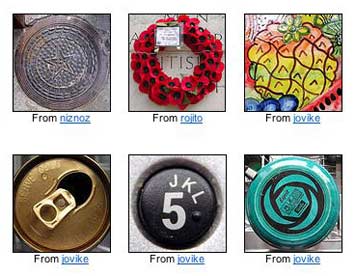
Detail from the Squared Circle Pool from Flickr, February, 2005.
The idea of social networking has always made me uneasy. To begin with, I'm not terribly social, and I don't exactly thrill to the idea of networking, either at bars or across an ethernet. I was never a big fan of collaborative filtering — the idea that just because I bought a cookbook on Amazon, I was instantly being targeted for every ergonomically correct onion slicer on the planet — and my opinion of user testing is only marginally cheerier than my view of market research. Basically, I cling to the notion of resistance, particularly when faced with the opposite: joining.
But Flickr has changed all that.
Flickr is a digital photo sharing website and web services suite that was developed by Ludicorp, a Vancouver, Canada company founded in 2002. It's a utopian oddity — a culture enabled by a technology that in turn enables a culture — and it's a brilliant example of socially networked software because it's free, its easy, and it makes sense. It also capitalizes on the great strengths of mobile computing, which is to say you can engage in all sorts of computational activities while being, well, mobile. Put simply, Flickr lets you upload photos, then helps you organize them, sequence them, post them, blog them, filter, edit and share them. In so doing, your photos become the conduit to other photos, and you "add contacts" (read "make new friends") through your pictures. And then — and here's the truly revolutionary part — you tag them, adding real suffixes that not only make sense to you but turn out to be rather functional where everyone else is concerned, too. The organizational groupings that follow (Flickr calls them "photo pools") come quite naturally from any of a number of shared interests — manhole covers (49 members), for instance, or squared circles (971 members) — but what emerges overall is a kind of anonymous, intoxicating curatorial energy. At the end of the day, Flickr is a robust, global resource born of random sightings and the many people eagerly willing to share them. And share they do.
These days, my skepticism about the current state of photography is mostly relegated to cameras which, despite being so captivatingly small, remain annoyingly enigmatic. Yet while I mourn the lack of a proper viewfinder on anything digital (a line in the sand, as far as I am concerned, that is tantamount to the end of civilization as we know it) I am equally taken with the idea of an image-driven community in which notions of territorial inequality are unheard of. Mary O'Hara's coming of age story about a young boy and his mercurial horse does indeed come to mind — and not only because Flicka sounds a lot like Flickr. Turns out that the horse in O'Hara's novel came from questionable bloodlines, which is to say he possessed a brilliance that could not be so easily traced. One might say the same about Flickr: sure, it's about social networking, and real-time interaction, and media-sharing, but it's also about the fundamental strength of pictures themselves as an international language, unbound by the normal exigencies of border and bias. In this view, it is decidedly more than the sum of its many glorious parts. And therein lies its genius.
